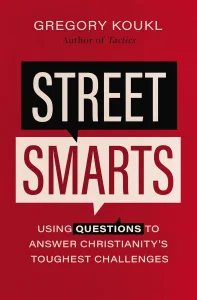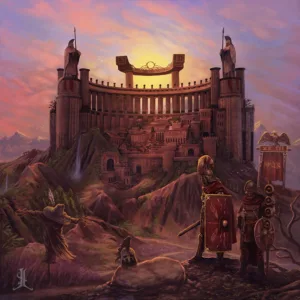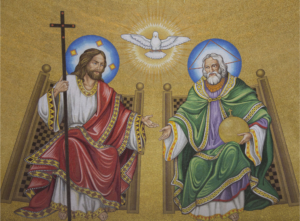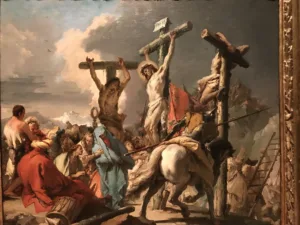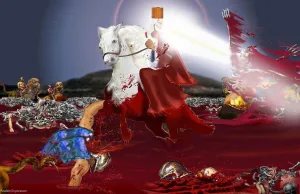Introduction
In these times there seems to be some confusion about what the gospel is. It is a broad topic, central to the understanding of the Christian worldview. So, we need to get it right.
Let’s start with a definition. The word itself is a translation of the New Testament Greek word euangelion. In Latin it is evangelium. The word appears only in the New Testament (97 times). There is one quasi-exception and that is Isaiah 52:7, where the Hebrew phrase good news shows twice.
It is a New Testament term for good reason, which I will get into later. Its simple translation to English is “good news.” We derive our English words evangelism and evangelist from the word.
What The Gospel Is NOT
It is regrettable that the term “good news” almost trivializes the gospel concept. For example, “Jesus loves you and has a plan for your life” or “Jesus loves you as you are” are both true statements. Yet, they are not, in this author’s opinion – The Gospel.
Adding the phrase, ‘Pray this prayer, “Jesus, I know I am a sinner and I accept you as my savior”’, may also be a true confession. But doesn’t help a whole lot.
Now why would I say that? Isn’t some version of that exactly how many people, if not all, begin the walk of believing in Jesus? To our shame, that is a fact.
The problem arises because it trivializes the need of right standing with God. And right standing with God is what people must have. In fact, this type of “gospel” message doesn’t even expose the relationship aspect of the concept. It is often called “easy-believeism.”
Solving The Problem
So, what is missing? In a word – context. If you don’t understand how bad the bad news is, you can’t contrast it with the good news. Context is important. The good news is so good because the bad news is so bad, and we need to keep that before us.
Often in life we find ourselves faced with a “good news/bad news” scenario we must navigate. In these situations, it is the full picture that provides the true picture of reality. If we look at one side of the issue, we get a distorted view. A distorted view is a false view. In no instance is the truth of this more important than in the case of a person’s standing with God.
We cannot guarantee the outcome of sharing the message of the gospel. But we can craft the message as best we are able. Then the hearer has a better chance at understanding the importance of what we are saying.
The rest is in the hands of God.
Keep It Simple
Christianity is a worldview. It has a religious component, but it is better understood as a way in which a wise person views life as a whole. It is a story, the story of how God created the cosmos, everything in it and his plan to see it operate.
There are only two beings and six events of importance we need include to cover it all. That is eight things to remember. Your telephone number, in the USA, has ten digits to remember.
In this age of self-affirmation, I hear too many people trivialize sin. On the one hand, they create a relative scale of morality. They use themselves as the measure of goodness. They hold that standard up against those whom they feel come short of their standard. Or they scoff at the notion of sin. They declare they would rather go to Hell because that’s where all the fun will be happening.
This model will cover all the bases in explaining the story of how God deals with man, but does so in a way that should be easy to comprehend.
The Beings In The Story – The Cast
Every story has characters in it and this, most important story, is no different. There are three characters in the Gospel Story, God, Man, and the Serpent. God is the creator, Man is a creature (created being), and the Serpent is also a creature, but of a supernatural nature. God is primary, the creatures (mankind and the serpent) are secondary. God is necessary, the creatures are contingent.
Though there are only three characters in the story, God, Man, and the Serpent, God is unique in his persona because though one being, he exists in three persons simultaneously. Both creatures only exist only as one person in one being. I am simply going to introduce the persons of the triune Godhead and not explain the nature of the being of God in depth in this blog.
If you want a good resource on the topic of the triune nature of God, I refer you to The Forgotten Trinity by James R. White. This post is not the place to tackle such an expansive topic and Dr. White does a good job of it.
God – The Father
The starting place is God. He is the starting place for all things. Consider the opening of the Bible ; God does not open with “I’m sorry to bother you but, may I have a minute of your time? I hope I won’t offend when I tell you I created everything there is.” What did God dictate Moses to write?
“In the beginning God created the heavens and the earth.” (Gen 1:1)
That is God’s opening. It’s a mic drop if I ever saw one. There is no warmup, no hesitation, no tentativeness. It is pure unmitigated majesty and confidence. And how did God do this creating?
“And God said, “Let there be …, and there was …,” he spoke it into existence from nothing. Six days of God said, “Let there be…, and there was …” (Gen 1:1-28)
To underscore his sovereignty, one day, a few thousand years later. Moses was walking in the wilderness and saw a bush burning but it was not consumed by the fire. God spoke from the bush and told Moses He wanted him to go back to Egypt to lead the Israelites out of slavery. Because Moses was sure there was a price on his head in Egypt, he haggled with God. He wasn’t sure the Israelites would follow him and asked God who will I say has sent me? God executes another mic drop.
God said to Moses, “I am who I am.” And he said, “Say this to the people of Israel: ‘I am has sent me to you.’” (Ex 3:14)
Again, there were no pleas, no explanations, no apologies. It is an assertion of his eternal existence.
My point is – God is God! His majesty, presence, capability, power, and ability to will and to act so far exceeds ALL that he has created. God never bends to anyone’s fears or demands.
He makes no defense of himself or apology to or request of anyone. He is and does – whatever pleases him!
Whatever the Lord pleases, he does, in heaven and on earth, in the seas and all deeps. (Psa 135:6).
God – The Son, Redeemer
The coming of Jesus in the flesh was the Incarnation of the second person of the Trinity, God the Son. It is no small matter to any of us. Jesus was unique in that he was fully man and fully God, as inexplicable as that is. And it was necessary to be that way.
In Genesis 3 the curse that God laid on the Serpent was that the seed of the woman would bruise the head of the serpent. The savior had to be born of a woman to redeem the offspring of the woman.
But as he [Joseph] considered these things, behold, an angel of the Lord appeared to him in a dream, saying, “Joseph, son of David, do not fear to take Mary as your wife, for that which is conceived in her is from the Holy Spirit. She will bear a son, and you shall call his name Jesus, for he will save his people from their sins.” All this took place to fulfill what the Lord had spoken by the prophet: (Mt 1:20-21)
According to the Law of Moses, a sin offering had to be a bull or a lamb without blemish (perfect). God is Holy; he is perfect. Any offering brought to him must be without blemish, otherwise that would be mocking God.
“Your lamb shall be without blemish, a male a year old. You may take it from the sheep or from the goats, (Ex 12:5)
God provided the perfect lamb without blemish in the person of his Son, the second person of the Trinity.
He is the only person in history who could provide the necessary requirements to be the Savior of the world. The sacrifice for the sins of mankind had to be human (to meet the need of being the seed of the woman). At the same time the sacrifice had to be God (to meet the need of being without blemish).
how much more will the blood of Christ, who through the eternal Spirit offered himself without blemish to God, purify our conscience from dead works to serve the living God. (Heb 9:14)
Therefore, as one trespass led to condemnation for all men, so one act of righteousness leads to justification and life for all men. For as by the one man’s disobedience the many were made sinners, so by the one man’s obedience the many will be made righteous. (Ro 5:18-19)
God – The Holy Spirit, Facilitator
The Holy Spirit is a most interesting “unsung hero” in the gospel story. He is the least-mentioned, yet huge behind-the-scenes player, in this whole story. He touches the hearts of men and women, convincing them to respond. He glorifies (makes famous) Christ. He enlivens the scripture to the minds of Mankind, enabling them to understand the truth. I have not scratched the surface of the Holy Spirit’s role turning betrayers into believers. He seeks no credit and generally gets little to none in the process, but he is there every step of the way. The Holy Spirit enables every act of God that is accomplished through man.
And I will ask the Father, and he will give you another Helper, to be with you forever, …But the Helper, the Holy Spirit, whom the Father will send in my name, he will teach you all things and bring to your remembrance all that I have said to you. (Jn 14:16, 26)
Nevertheless, I tell you the truth: it is to your advantage that I go away, for if I do not go away, the Helper will not come to you. But if I go, I will send him to you… When the Spirit of truth comes, he will guide you into all the truth, for he will not speak on his own authority, but whatever he hears he will speak, and he will declare to you the things that are to come. (Jn 16:7, 13)
The Serpent – The Deceiver
This member of the cast of the Gospel Story is a bit more difficult to gather origin information about but it can be done by comprehensive look at the Bible. However, though not to be trifled with nor in any way underestimated, his role is relegated to that of a supporting actor. I will therefore not spend a lot of time on him in this article.
At the same time, his role is important enough that I will devote an article or two (depending on how complex the task becomes) on defining his nature, his character, his role, and his end. He is a created being and therefore, subject to the Will of God. His ream of operation is primarily in the non-material (supernatural) sphere but can also operate in the material (earthly) sphere. Here are two descriptions of him in metaphors.
When the Lord has given you rest from your pain and turmoil and the hard service with which you were made to serve, you will take up this taunt against the king of Babylon: “How the oppressor has ceased, the insolent fury ceased! …
“How you are fallen from heaven, O Day Star, son of Dawn! How you are cut down to the ground, you who laid the nations low! You said in your heart, ‘I will ascend to heaven; above the stars of God I will set my throne on high; I will sit on the mount of assembly in the far reaches of the north; I will ascend above the heights of the clouds; I will make myself like the Most High.’ But you are brought down to Sheol, to the far reaches of the pit… (Isa 14:3-4, 12-15)
And.
The word of the Lord came to me: “Son of man, say to the prince of Tyre, Thus says the Lord God: “Because your heart is proud, and you have said, ‘I am a god, I sit in the seat of the gods, in the heart of the seas,’ yet you are but a man, and no god, though you make your heart like the heart of a god—
…You were in Eden, the garden of God; every precious stone was your covering, sardius, topaz, and diamond, beryl, onyx, and jasper, sapphire, emerald, and carbuncle; and crafted in gold were your settings and your engravings. On the day that you were created they were prepared. You were an anointed guardian cherub. I placed you; you were on the holy mountain of God; in the midst of the stones of fire you walked. You were blameless in your ways from the day you were created, till unrighteousness was found in you. In the abundance of your trade you were filled with violence in your midst, and you sinned; so I cast you as a profane thing from the mountain of God, and I destroyed you, O guardian cherub, from the midst of the stones of fire. Your heart was proud because of your beauty; you corrupted your wisdom for the sake of your splendor. I cast you to the ground; I exposed you before kings, to feast their eyes on you. (Ezk 28:1-2, 13-17)
From these passages we learn a few things:
- He is created, therefore, subordinate to God.
- He operates in the heavenlies normally.
- He is arrogant.
- He wants God’s place in the order of things.
- He was created blameless and with free will.
- He exercised his free will to try and usurp God’s throne.
- He was cast out of heaven by God.
- Though defeated, he still tries to thwart God’s plan through deceit and accusation.
Though meant by God to co-rule the heavenly realm with Him, the Serpent threw it all away in the pursuit of his own desires.
Man – The Deceived
On Day 6 of creation week, God created Mankind, the final cast member in the Gospel Story. But this act of creation was different than the rest of earthly creation. Mankind is the only part of creation that God made in the image of himself, after his likeness. God created Mankind to be like himself in that he would bear God’s image and co-rule with God. Mankind was to have dominion over all the lesser creation.
Then God said, “Let us make man in our image, after our likeness. And let them have dominion over the fish of the sea and over the birds of the heavens and over the livestock and over all the earth and over every creeping thing that creeps on the earth.” (Ge 1:26)
He then told them to go out into the world and fulfill that mandate.
“And God blessed them. And God said to them, “Be fruitful and multiply and fill the earth and subdue it, and have dominion over the fish of the sea and over the birds of the heavens and over every living thing that moves on the earth… And God saw everything that he had made, and behold, it was very good. And there was evening and there was morning, the sixth day. (Ge 1:28, 31a)
Though meant by God to co-rule with Him, Man threw it all away in the pursuit of his own desires.
The history of Man from the Garden through today is the history of God’s redemptive plan for man. The Bible reveals the plan. That plan is a bloody one, requiring blood sacrifice throughout history. Blood was exchanged for the forgiveness of sin until the arrival of the Redeemer.
We now have in mind who the players are in the gospel story. Let’s look at the major events that play out in the story.
The Plot of The Story – The Milestones
A good story has a good plot. If it were just characters sitting around there wouldn’t be much to tell or a way to attract interest. The Gospel Story is no different. It has a plot and how that plot works out in the individual’s life is a true matter of life or death.
The Creation
In Genesis 1 & 2 we find the Bible’s account of the creation of the Cosmos. For the purpose of this article I am NOT analyzing or defending the account. It is true in both timing and scope, not because I say so but because God says so.
God is not man, that he should lie, or a son of man, that he should change his mind. Has he said, and will he not do it? Or has he spoken, and will he not fulfill it? (Num 23:19)
If you have trouble with the proposition, I am sorry to tell you it’s not my proposition. It’s God’s. You’ll have to take up your offense with him.
God created the material cosmos we live in, from nothing, through the power of His Word, in five days (Ge 1:1-25). He then, on the sixth day, made Man to function as a co-regent with him over all of the creation God had made. (Ge 1:26 – 31)
God rested from his creating on the seventh day.
It is beyond the scope of this article to defend the proposition I have just asserted. I may do that in a later post. For now, I will leave it as assertion because the matter of the timing and the duration of creation are under debate but even science recognizes that the cosmos had a beginning. And, that is established as true.
Beginnings require a sufficient cause. That sufficient cause cannot be random chance because the cosmos from top to bottom is full of messages. Messages require a messenger. That messenger is God.
Sorry, that is all that the scope of this article allows in the way of justification for the assertion.
In Genesis 2 we see the details of how God formed Man and Woman of the Earth, brought them together and gave them their stewardship mandate. He also placed on them one restriction — they could eat of everything in the garden except from the Tree of the Knowledge of Good and Evil.
This was one sweet deal; close fellowship with God, sovereignty over ALL creation under the authority of God, a place to live that can only be described as paradise, a divine reason to live and work with the opportunity to partake of Everlasting Life by simply following God’s lead.
And man blew it.
The Fall
The Serpent deceived Mankind with a promise to be as wise as God. Mankind fell for the deceit, betrayed his allegiance to God and fell prey to his own lust. He refused to follow the one commandment of God. He refused to refrain from eating from the tree of the Knowledge of Good and Evil. Adam and his wife Eve ate from that tree and by that act of disobedience brought sin into the world and death by sin.
Therefore, just as sin came into the world through one man, and death through sin, and so death spread to all men because all sinned — (Rom 5:12)
Along with death came the curse of God on all the parties to the rebellion:
- To the Serpent (Satan) – the crushing of his head by the seed of the woman (Ge 3:14-15)
- To the woman (Eve) – pain in childbearing. Conflicting desires with her husband, submitting to him. (Ge 3:16)
- To the man (Adam) – the ground cursed as he works it. Making a living becomes painful. Death comes to him, and from him as representative of all mankind fell on all mankind. (Ge 3:17-19)
The Redemption Promise
But God was not taken by surprise. He knew mankind would fail and, in his love, was ready with a redemption plan. Our first glimpse of the redemption promise comes in
… he shall crush your head (Gen 3:15)
God remained committed to his plans for a family and promises to redeem the situation. And the history of the Bible from that point through the entire Old Testament is a progressive unfolding of the redemptive promise of God through the likes of Noah, Abraham, Joseph, Moses, David, and the Prophets until the time of the Incarnation of God as Man in the Son of God/Son of Man, Jesus Christ.
Through all the ups and downs of God’s dealing with mankind throughout history, he has remained committed to, and is still committed to having a family that will co-rule his entire creation with him. At every point that man has failed God, God has stepped up a new aspect of the plan to correct the failure. The pinnacle of his plan was revealed in the incarnation of the Son, the Second Person of the Trinity.
The Cross
The express purpose of his coming was to allow his people to murder him. He committed no offense. He broke no rules. Despite that, he allowed us to murder him. With that voluntary condescension he paid the price to redeem the elect of God. The elect are those, given by the Father to the Son, for the Son to save.
All that the Father gives me will come to me, and whoever comes to me I will never cast out. (Jn 6:37)
Jesus was not a martyr per se. Martyrs are victims of persecution and suffering inflicted on them by an external party. Jesus – God the Son – agreed with God the Father to become the price of redemption for mankind. He allowed his people to murder him.
Have this mind among yourselves, which is yours in Christ Jesus, who, though he was in the form of God, did not count equality with God a thing to be grasped, but emptied himself, by taking the form of a servant, being born in the likeness of men. And being found in human form, he humbled himself by becoming obedient to the point of death, even death on a cross. (Php 2:5-8)
For this reason the Father loves me, because I lay down my life that I may take it up again. No one takes it from me, but I lay it down of my own accord. I have authority to lay it down, and I have authority to take it up again. This charge I have received from my Father.” (Jn 10:17-18)
this Jesus, delivered up according to the definite plan and foreknowledge of God, you crucified and killed by the hands of lawless men. (Act 2:23)
The death of Jesus was not happenstance. God planned it and it was necessary. It provided the forgiveness of sins for the man who betrayed God and found himself under the wrath of God.
Indeed, under the law almost everything is purified with blood, and without the shedding of blood there is no forgiveness of sins…
for then he would have had to suffer repeatedly since the foundation of the world… But as it is, he has appeared once for all at the end of the ages to put away sin by the sacrifice of himself. (Heb 9:22, 26b)
When he died on the Cross, he accomplished all that he came for. When he said, “It is finished”, he didn’t mean that he merely completed his work. He meant he completed all that could be done to redeem mankind. No one and nothing can add anything.
When Jesus had received the sour wine, he said, “It is finished,” and he bowed his head and gave up his spirit. (Jn 19:30)
The Resurrection/Ascension
The Cross is pivotal in the redemption of man. It is the means that God uses to secure right standing for believers. But the Resurrection is also pivotal to the gospel story. Without it Calvary would be another mere martyr’s death to log in the annals of history
The Resurrection is proof that Jesus is God. He told us he would lay his life down and pick it back up – and he did.
and was declared to be the Son of God in power according to the Spirit of holiness by his resurrection from the dead, Jesus Christ our Lord, (Rom 1:4)
The resurrection was no back-alley hidden trick or prank. Documentation of eyewitnesses, both within scripture and in extra-biblical references, is extensive.
that he was buried, that he was raised on the third day in accordance with the Scriptures, and that he appeared to Cephas, then to the twelve. Then he appeared to more than five hundred brothers at one time, most of whom are still alive, though some have fallen asleep. Then he appeared to James, then to all the apostles. Last of all, as to one untimely born, he appeared also to me. (1Co 15:4-8)
The End, Heaven or Hell
This is the final scene to play out in the Gospel Story. It is the event that ranks highest on both the joy scale and the terrible scale – depending on where you stand with Christ when it happens. This is the point of no return.
Christ returns to Earth at the end of human history. This time he comes with Judgement and not Salvation – that decision is already “cast in stone”.
Those who have answered the call of Christ, whose names are written in the Book of Life, come to Judgment for their Eternal Reward, life in the presence of God in the New (restored) Heaven and Earth.
for then he would have had to suffer repeatedly since the foundation of the world. But as it is, he has appeared once for all at the end of the ages to put away sin by the sacrifice of himself. And just as it is appointed for man to die once, and after that comes judgment, so Christ, having been offered once to bear the sins of many, will appear a second time, not to deal with sin but to save those who are eagerly waiting for him. (Heb 9:26b-28)
In my Father’s house are many rooms. If it were not so, would I have told you that I go to prepare a place for you? And if I go and prepare a place for you, I will come again and will take you to myself, that where I am you may be also. (Jn 14:2-3)
For those whose names are not written in the Book of Life it will be a much more dismal fate – Eternal Damnation – away from the presence of the God they despise, in the Lake of Fire.
And I saw the dead, great and small, standing before the throne, and books were opened. Then another book was opened, which is the book of life. And the dead were judged by what was written in the books, according to what they had done. And the sea gave up the dead who were in it, Death and Hades gave up the dead who were in them, and they were judged, each one of them, according to what they had done. Then Death and Hades were thrown into the lake of fire. This is the second death, the lake of fire. And if anyone’s name was not found written in the book of life, he was thrown into the lake of fire. (Rev 20:12-15)
Everyone will receive the end they spent their life pursuing,
— their “truth” —
or
they will find redemption from that pursuit and eternal life and forgiveness in Christ.
Gregory Koukl’s best-selling book of practical apologetics, Tactics, wrote the game plan for discussing your Christian convictions with skeptics. In this follow-up, Koukl—a leader of clear-thinking Christianity—reveals the fundamental flaws in common, current challenges to Christian beliefs and values and provides step-by-step strategies to question and reveal those shortcomings.
Street Smarts offers model questions and sample dialogues to help guide believers in persuasive conversations about hot-button issues like:
- Relativism
- The trustworthiness of Scripture
- The claims of the Gospel
- Abortion
- Marriage, sex, and gender
This book will teach you how to tackle those discussions that believers often avoid because they feel out of their element, vulnerable, or exposed. Lucid, well-organized, and easy-to-follow, Street Smarts provides a specific set of questions—the same questions Koukl uses in his own encounters—that are embedded in sample mini-dialogues that you can use to have fruitful debates with non-believers.

Logos Bible Software
The Logos Bible Study app is a powerful Bible study and sermon prep platform. It allows you to study Scripture, commentaries, devotionals, Bible dictionaries, and more from your computer, tablet, or phone. If you want to know the Creator of the Universe intimately, you want this app.

Elevated Faith
Are you looking for apparel or swag? We picked Elevated Faith because of the diversity of their offerings. They offer some great ideas for gifts for others and treats for yourself.


